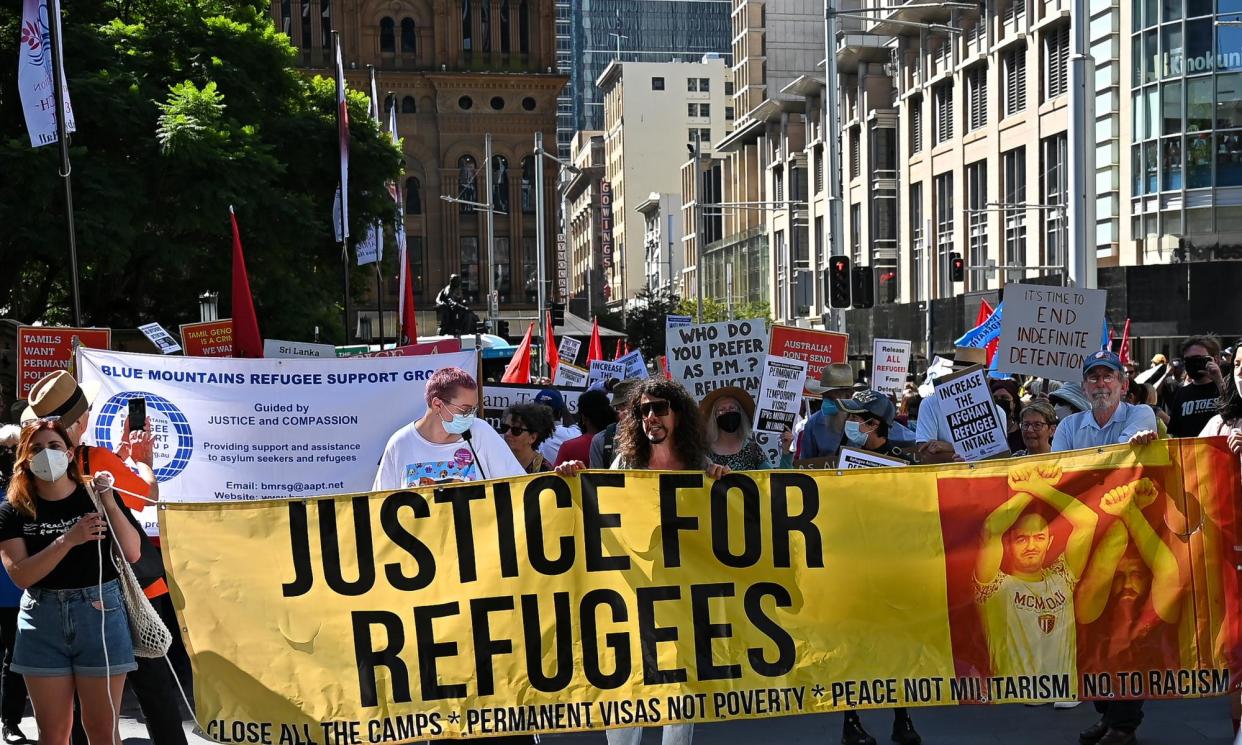Government gives itself power to pay any non-citizen to leave Australia

The federal government has quietly given itself the power to pay any unlawful non-citizen to leave Australia or for foreign countries to resettle them, in what the Greens have labelled an attempt to “bribe” asylum seekers.
New regulations made on 15 August expanded the return and reintegration assistance program (RRAP), which currently pays up to $7,500 cash plus expenses to people on bridging visas, or those who arrived by boat, to leave Australia.
Under the new rules “all non-citizens” will be eligible, expanding payments to categories of people including those who flew to Australia but had their asylum claims rejected onshore and those whose visas were cancelled on character grounds.
The expanded program is projected to cost $31.1m over three years, although the department has said it is “demand-driven”.
The new instrument also allows the government to draw from the $255m it allocated to respond to the high court’s decision that indefinite immigration detention is unlawful, to pay for “post-removal support”.
That will “support the settlement and integration of non-citizens in a foreign country where settlement occurs pursuant to an arrangement between Australia and a foreign country”, the explanatory statement said.
Tender documents, seen by Guardian Australia, explain that non-citizens are eligible to receive counselling, help obtaining travel documents, pre or post-departure accommodation and air tickets.
They also receive “reintegration assistance (cash) of up to USD $5,100”, or about AU$7,500, and can get “up to USD $2,000” of in-kind benefits such as assistance from service providers.
Two contract extensions published on 14 June showed that existing providers IOM and Serco Australia were paid an extra $2.5m each to deliver the RRAP from July to December 2024, bringing the total value of their contracts since 2018 to $40m and $30m respectively.
The explanatory statement for the regulation said the changes will “achieve increased departure outcomes, especially when paired with increased immigration compliance activity”.
This would have “flow-on effects reducing the status resolution population” and save the federal government money on status resolution support services and immigration detention costs, it said.
In March 2023 Guardian Australia revealed that a “record” 100,000 people who had sought asylum onshore remained in Australia, including 72,875 whose claims had been refused, who were yet to be deported.
The latest Australian Border Force statistics show there were, as of 30 June, 918 unlawful non-citizens in immigration detention or alternative places of detention. About half of those were there because of character cancellations and a further 236 were in community detention.
The Greens immigration spokesperson, David Shoebridge, said that as one of the home affairs minister Tony Burke’s “first significant acts”, the decision “[said] a lot about Labor’s direction on migration”.
“This expands the budget for the Albanese government to bribe people seeking asylum to return to a country where they fear persecution and violence,” Shoebridge said this week.
“It’s an incomprehensibly cruel system that Labor is expanding here, which refuses people seeking asylum any work or study rights, drives them into poverty and then offers them a small bribe to return to persecution.”
In Senate estimates in March, the home affairs department secretary, Stephanie Foster, defended the RRAP, describing payments as “fairly modest”.
Related: Labor calls Peter Dutton a ‘sook’ in parliament for his continued attacks on Gaza visa process
In that hearing, Labor senator Murray Watt said the payment was “simply to assist people return home”, and demanded that Shoebridge withdraw a previous claim they amounted to bribes. “It’s just untrue,” Watt said. “No one’s bribing anyone.”
Paul Power, chief executive of the Refugee Council, said that “providing assistance so [that leaving Australia] is financially possible isn’t in and of itself a bad thing”.
But he said it was important to ensure it was not done in such a way that “people are pressured in circumstances where they may have other options to explore”, such as protection claims.
Under the former immigration minister, Andrew Giles, Labor introduced a bill to give it power to compel unlawful non-citizens to cooperate with steps to deport them. The bill stalled due to opposition from the Greens and lack of cooperation from the Coalition which first delayed it and then sought amendments.
A spokesperson for the home affairs department said these latest changes “provide the government with greater flexibility to effect status resolution outcomes for non-citizens who have exhausted all avenues to remain in Australia”.
“RRAP supports eligible non-citizens to return home voluntarily where they do not have the financial capacity to do so independently,” they said.
The spokesperson said post-removal support – payable to foreign governments or third parties – could cover short-term accommodation and employment assistance, medical assistance, and “other appropriate integration costs where the receiving country requires support for the individual”.
These “will allow the department to facilitate the return or removal of non-citizens who have exhausted all avenues to remain in Australia when exceptional arrangements are required to provide support upon arrival in the receiving country”.
Guardian Australia contacted the home affairs minister, Tony Burke, for comment.
Additional reporting by Sarah Basford-Canales


